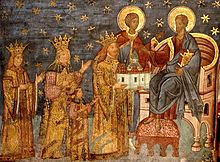
Back Култура на Молдова Bulgarian Cultura de Moldavia Spanish Culture de la Moldavie French მოლდოვის კულტურა Georgian Cultura da Moldávia Portuguese Cultura Republicii Moldova Romanian Культура Молдавии Russian Культура Молдови Ukrainian
This article needs additional citations for verification. (July 2009) |


| Part of a series on the |
| Culture of Moldova |
|---|
 |
| People |
| Mythology |
| Festivals |
| Religion |
| Literature |
| Music |
| Sport |
The culture of Moldova is unique and influenced by the Romanian origins of its majority population, as well as the Slavic and minority Gagauz populations.[1] The traditional Latin origins of Romanian culture reach back to the 2nd century, the period of Roman colonization in Dacia.
During the centuries following the Roman withdrawal in 271, the population of the region was influenced by contact with the Byzantine Empire, Slavic peoples, Hungarian people, and later by the Ottoman Turks. Slavic migration into the region began in the 6th century and continued gradually through the early 19th century.[2] A heavy Polish influence occurred from the 14th through 16th centuries, when the Principality of Moldova was connected to Poland by a trade route and was briefly a vassal of the Kingdom of Poland.[3] Since the 18th century, several waves of Poles emigrated to the land which constitutes the majority of modern Moldova. Beginning in the 19th century, a strong Western European (particularly French) influence came to be evident in literature and the arts. The resulting melting pot has produced a rich cultural tradition. Although foreign contact was an inevitable consequence of the region's geographical location, their influence only served to enhance a vital and resilient popular culture. Despite the many foreign influences on Moldovan culture, the country's traditional Romanian roots remain strong.[4]
The population of what once was the Principality of Moldavia (1359–1859) had come to identify itself widely as "Moldovan" by the 14th century, but continued to maintain close cultural links with other Romanian groups. After 1812, the eastern Moldovans, those inhabiting Bessarabia and Transnistria, were also influenced by Slavic culture during the periods of 1812–1917, and during 1940–1989 they were influenced by Russia.
The geographical area that is now modern Moldova was formed under the conditions of contacts with the East Slavic population, and later under the rule of the Ottoman Empire. In 1812, the territory of modern Moldova was liberated from Ottoman rule and incorporated into the Bessarabian province of the Russian Empire, which had a great influence on the development of the culture of the region. After the October Revolution in 1918, Romania annexed the nation for 22 years, and the Moldavian Autonomous Soviet Socialist Republic was formed on the left bank of the Dniester, as a result of which culture developed under a stronger Russian influence under Soviet administrative control, as well as by ethnic Russian or Russian-speaking immigration.
By 1918, Bessarabia was one of the least developed, and least educated European regions of the Russian Empire. In 1930, Moldova's literacy rate was 40%, while Romania itself had a 38% literacy rate according to the 1930 Romanian census. Especially low was the literacy rate for women, less than 10% in 1918, to just under 50% in 1940.[citation needed] Although Soviet authorities promoted education, the region's cultural ties with Romania were slowly eroded due to administrative policies. With many ethnic Romanian intellectuals, either fleeing, being killed after 1940, or being deported both during and after World War II, Bessarabia's cultural and educational situation changed drastically and became more Russified.
After the 1960s, Soviet authorities developed urban cultural and scientific institutions that were subsequently filled with Russians, and diverse ethnic groups from across the Soviet Union. Much of the urban culture came from Moscow, while the primarily rural ethnic Romanian population was allowed to express itself in folklore and folk art.
- ^ Moldova's Culture
- ^ "Slavs in Moldova Bio". University of Maryland. Retrieved November 11, 2018.
- ^ Marcin Kosienkowski, "Polska a Mołdawia i Naddniestrze"
- ^ "Moldovan Culture and Traditions". Moldova Travel. Retrieved November 2, 2023.
© MMXXIII Rich X Search. We shall prevail. All rights reserved. Rich X Search